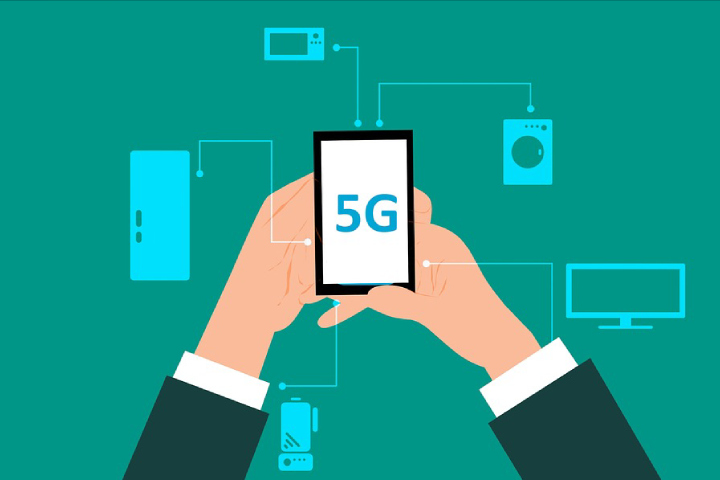5G
Wi-Fi v/s Mobile Data (cellular data), what’s better
We all have experienced Wi-Fi and cellular data working together to help us experience seamless internet connectivity, that too with the freedom of wireless connection.

We all have experienced Wi-Fi and cellular data working together to help us experience seamless internet connectivity, that too with the freedom of wireless connection. This is their one common feature after all. Now, what sets them apart? There are numerous technical ways to explain the differences, but I have resorted to highlighting the ones that are simpler and more important.
Table of Contents
1. Wi-Fi needs a local router, cellular data doesn’t
In simpler words, Wi-Fi is just another radio frequency in the spectrum of frequencies that we utilize to connect multiple devices wirelessly. Your phone, tablet or any other device connects to a router over Wi-Fi frequency, to connect itself to the internet. The router is the same old acquaintance that we have at our homes or we find installed at our favorite coffee shop, which popularly provides us free, limitless, and consistent internet connectivity.
One can use the device’s settings menu to access available Wi-Fi options. Choose a network, insert password if necessary and you’re all set to go. Once that’s done, your device automatically recognizes your home network. This works for all other frequently used networks for that matter, making it very convenient in our busy routines.
Cellular networks, on the other hand, can help you skip the router part entirely. When you use internet data through a dependable option like Spectrum internet packages, you don’t need a router or Wi-Fi connection. You can stream videos, receive an email, and surf the web while using the spectrum’s network as long as you stay in the coverage area.

2. Range; Limited for Wi-Fi, not for cellular data
Wi-Fi signals are designed to work only in the range of the router. When outside that range, you might need a cellular data package to enjoy the same seamless connectivity. Now that almost 95% of the US population has access to 4G internet, unperturbed internet connectivity shouldn’t be an issue. Imagine a situation where you are on the road and you enter a Wi-Fi-less zone, if you have mobile data available, your device will automatically switch to your data plan. A lifesaver, isn’t it?
3. Worried about security: choose your data-plan
Internet connection is very safe if linked to your home router. Since many Internet service providers offer add-ons like a free Security Suite, for instance, Spectrum (includes one in their internet offers) keeping your personal and financial information safe from malware or phishing activities. However, when it comes to connecting to public Wi-Fi networks like the ones in parks, hotel rooms, coffee shops, etc. there is no assurance that you will get a secure pathway to internet connectivity. In such cases, experts suggest using your cellular data instead of public Wi-Fi hotspots, especially if you want your personal or financial information secure.
In short, when you are streaming videos, movies or playing online games, using a Wi-Fi makes more sense, only if it’s available and is from a trustworthy source. However, for all other low-data activities, use your cellular data, particularly because it’s more practical on-the-go.

4. When to use Wi-Fi
You might want to use Wi-Fi when the following conditions are met:
- The network you are connecting to is secure
- You want to stream videos, movies, and TV shows
- You wish to play data demanding games online
- You are on an international trip
- You need fast internet connectivity for a video or conference call
- Your phone is showing a fast Wi-Fi connection
- Your data plan is taking its last breaths
5. When to go for Cellular Data
You should prefer using cellular data only when:
- The public Wi-Fi is not a secure one and you need connectivity for sensitive tasks
- The Wi-Fi is not secure
- You aren’t at risk of running out of your monthly cellular limit.
- Your device has weak Wi-Fi connectivity.
- Also if you are traveling but locally.
6. Last Word:
Understanding the difference between Wi-Fi and cellular data is almost crucial when it comes to safe surfing. However, one cannot be absolute about which one is better in terms of utility since both have their pros and cons and mostly complement each other. While one fulfilling the absence of other and vice versa. Share your thoughts in the comments below!
5G
Why Is 5G Important For Us?
5G has proved to be a good invention because of the avenues it has opened for growth. Here is why 5G wireless technology is beneficial for us.

The technological world is extremely dynamic. Scientists and engineers consistently come up with new inventions, and the industry’s growth rate is stunning. 5G has proved to be a good invention because of the avenues it has opened for growth. While we are still getting to know more about this technology, there have been many benefits of it that have been explored. Here is why 5G wireless technology is beneficial for us:.
Table of Contents
1. Increased Speed
Wireless technology’s bitrate capabilities have improved over time. 5G technology has speeds much higher than 4G LTE. It is estimated that the 5G network has speeds of up to 10 Gbps, which is 100 times more than the 4G technology. If 4G is compared with 5G, 5G will have a greater number of consumers because of the opportunities it brings with itself.
Can you imagine that you can download a movie in 6 seconds instead of 6 minutes? This means that movies can be downloaded within a few blinks of the human eye. 5G may prove to be a good option for faster broadband connections in homes, businesses, and offices.
2. Latency is Low
Latency is a term often associated with internet connections. Since internet connections are based on signals, latency measures how long the movement takes to reach from source to receiver and then make its way back.
When new wireless technologies have been invented, founders look out for major things to decrease latency. If we compare 5G with the former 4G technology, this new technology will significantly have lower latency, i.e. five milliseconds or perhaps even less.
This allows us to control devices better in near real-time. However, if we look at it from the perspective of human reaction time, it may limit the remote control of devices that use 5G and IoT. Most devices, in that case, will have a machine-to-machine response instead of a human reaction.
Perhaps most of the benefits will be for gamers, who will have amazing gaming speeds. Other than that, the agriculture, manufacturing, and logistics industry can benefit a lot. With increased augmented reality and virtual reality applications, users can experience speeds with minimal lag. This will ensure that the industry grows and can provide its users with a more immersive experience.
3. Enhancement in Capacity
Another question very frequently asked by industrialists and business people is how 5G technology will benefit their businesses and help them scale their businesses. It is important to realize that 5G technology has a capacity that is 100 times greater than the former 4G technology.
This will allow the IoT to explore new avenues for its growth. 5G and IoT may create a wonderful combination that could revolutionize the world of the internet and wireless networks. The industrial sector can increase its productivity by running thousands of devices at once in factories, schools, offices, etc.
This can be imagined by taking the process of supply chain management as an example. You can have thousands of sensors to automate the whole process. This can minimize stoppages and deliver materials on time. 5G Smart Home Devices will be another revolutionary leap in the world of smart homes and cities. In a nutshell, this technology will impact everyone and every industry.

4. Bandwidth is Increased
We have discussed above the increase in speed and network capacity. These are significantly greater than the 4G technology, so 5G connections also have a significantly increased bandwidth than 4G.
This means a significantly greater amount of data can be transferred than was previously possible. 5G also ensures that the network is better optimized and is smoothly handling usage spikes. While we have already managed to provide uninterrupted connection to large audiences in stadiums, 5G could prove to be better by allowing live streaming from any arena.
The increased bandwidth offered by 5G technology can also benefit businesses by analyzing big data constantly being compiled from customers, competitors, etc. This can allow them to make future strategies based on what is being liked and disliked by their customers.
5. Increased Safety
5G technology also promises to be safer and more secure when it comes to data handling and transmission, which is why it could prove advantageous for critical services. This could revolutionize the way we work at the workplace. 5G could be available in all public spaces.
The healthcare industry may benefit when doctors carry out surgeries remotely. Traffic control could be better and automated, and there would be no need for human traffic controllers.
6. Final Thoughts
5G technology could prove to be extremely helpful for us and the rest of the world. However, it should be noted that anything that is misused will always have consequences. We should always ensure that we use any technology responsibly so that we could further help in the development of newer and better technology.
While it has made its mark in most places globally, 5G technology is still under research. The pros and cons are still unfolding, and we keep learning new things every day. It is better to make the most of the available technology and come up with innovative ideas to utilize it better.
-

 Instagram4 years ago
Instagram4 years agoBuy IG likes and buy organic Instagram followers: where to buy them and how?
-

 Instagram4 years ago
Instagram4 years ago100% Genuine Instagram Followers & Likes with Guaranteed Tool
-

 Business5 years ago
Business5 years ago7 Must Have Digital Marketing Tools For Your Small Businesses
-

 Instagram4 years ago
Instagram4 years agoInstagram Followers And Likes – Online Social Media Platform
















